CDK phosphorylation of a novel NLS-NES module distributed between two subunits of the Mcm2-7 complex prevents chromosomal rereplication
- PMID: 16093348
- PMCID: PMC1237101
- DOI: 10.1091/mbc.e05-05-0412
CDK phosphorylation of a novel NLS-NES module distributed between two subunits of the Mcm2-7 complex prevents chromosomal rereplication
Abstract
Cyclin-dependent kinases (CDKs) use multiple mechanisms to block reassembly of prereplicative complexes (pre-RCs) at replication origins to prevent inappropriate rereplication. In Saccharomyces cerevisiae, one of these mechanisms promotes the net nuclear export of a pre-RC component, the Mcm2-7 complex, during S, G2, and M phases. Here we identify two partial nuclear localization signals (NLSs) on Mcm2 and Mcm3 that are each necessary, but not sufficient, for nuclear localization of the Mcm2-7 complex. When brought together in cis, however, the two partial signals constitute a potent NLS, sufficient for robust nuclear localization when fused to an otherwise cytoplasmic protein. We also identify a Crm1-dependent nuclear export signal (NES) adjacent to the Mcm3 NLS. Remarkably, the Mcm2-Mcm3 NLS and the Mcm3 NES are sufficient to form a transport module that recapitulates the cell cycle-regulated localization of the entire Mcm2-7 complex. Moreover, we show that CDK regulation promotes net export by phosphorylation of the Mcm3 portion of this module and that nuclear export of the Mcm2-7 complex is sufficient to disrupt replication initiation. We speculate that the distribution of partial transport signals among distinct subunits of a complex may enhance the specificity of protein localization and raises the possibility that previously undetected distributed transport signals are used by other multiprotein complexes.
Figures

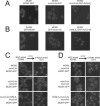
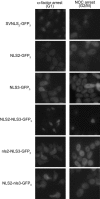
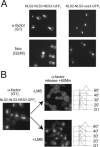

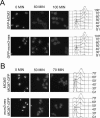


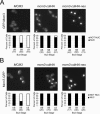

References
Publication types
MeSH terms
Substances
Grants and funding
LinkOut - more resources
Full Text Sources
Molecular Biology Databases
Miscellaneous

